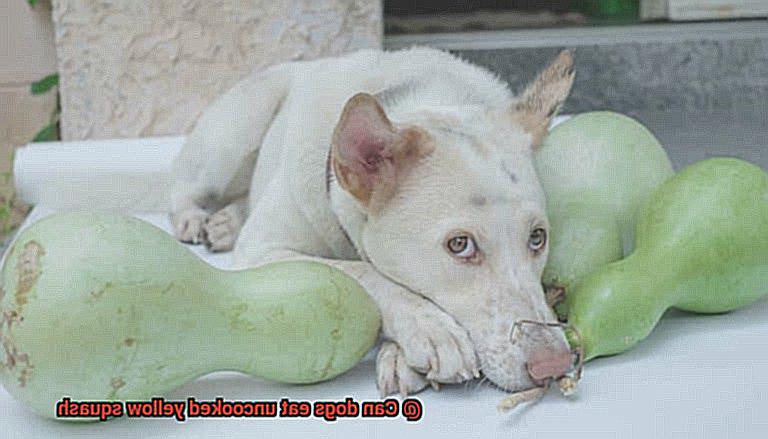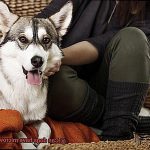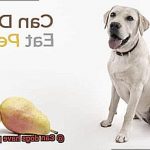Can dogs eat uncooked yellow squash?
Today, we’re diving headfirst into the world of paw-some treats for our beloved four-legged buddies. And guess what? Our spotlight is shining brightly on the unassuming yet oh-so-delicious yellow squash – a veggie that’s not only bursting with vibrant color but also packed with health benefits.
Let’s be real here, folks. Sharing scrumptious goodies with our furry pals creates an unbreakable bond like no other. But when it comes to tossing raw yellow squash into Fido’s food bowl, questions start swirling in our heads: Is it safe? What should we do and avoid? Well, fret not, my dear readers. We’re here to unravel the mysteries surrounding this crunchy delight and ensure your pup’s safety and satisfaction.
So buckle up, grab a snack (for yourself), and get ready for a canine culinary adventure like no other. Together, we’ll explore the wonders of uncooked yellow squash for dogs, debunking common misconceptions along the way while shedding light on the potential risks and rewards. Are you excited? ‘Cause I sure am. Let’s embark on this tasty journey together.
Can Dogs Eat Uncooked Yellow Squash?
Contents
- 1 Can Dogs Eat Uncooked Yellow Squash?
- 2 Potential Risks of Feeding Uncooked Yellow Squash to Dogs
- 3 Benefits of Feeding Cooked Yellow Squash to Dogs
- 4 Removing the Seeds Before Serving Yellow Squash
- 5 How Much Yellow Squash Should Dogs Eat?
- 6 Introducing Yellow Squash Into Your Dog’s Diet Gradually
- 7 Signs of Allergies or Sensitivities to Yellow Squash in Dogs
- 8 The Role of Veterinarians in Ensuring a Balanced Diet for Your Dog
- 9 Conclusion
French Bulldogs are a popular breed known for their friendly nature and adorable appearance. As a loving pet owner, it’s natural to want to provide them with a variety of nutritious foods. One vegetable that often comes to mind is yellow squash.
But can French Bulldogs eat uncooked yellow squash? Let’s explore the factors to consider before adding this veggie to their diet.
The Nutritional Benefits of Yellow Squash:
Yellow squash is packed with essential vitamins and minerals that can be beneficial for your French Bulldog’s health. It contains vitamins A, C, and K, which support their immune system, vision, and blood clotting functions. Additionally, yellow squash provides minerals like potassium and magnesium, which help regulate fluid balance and maintain healthy muscle function.
Digestibility Concerns:
While yellow squash is generally safe for dogs to eat, some may struggle with digesting raw vegetables. French Bulldogs, in particular, have been known to have sensitive stomachs. Therefore, it’s important to introduce yellow squash gradually into their diet and monitor their reaction.
To make it easier for your furry friend to consume, consider cutting the yellow squash into small, bite-sized pieces or lightly cooking it. This will help break down the tough fibers and improve digestibility. By taking these steps, you can minimize the chances of stomach upset or discomfort.
Potential Health Conditions or Allergies:
If your French Bulldog has any existing health conditions or known allergies, it’s crucial to consult with your veterinarian before introducing new foods into their diet. They will be able to provide tailored advice based on your dog’s specific needs and ensure that yellow squash is safe for them to enjoy.
Moderation is Key:
As with any food, moderation is key when it comes to feeding yellow squash to your French Bulldog. While it is a nutritious vegetable, feeding too much can lead to digestive upset or diarrhea. Remember, yellow squash should be part of a balanced diet and not the main component.
Preparation and Safety Tips:
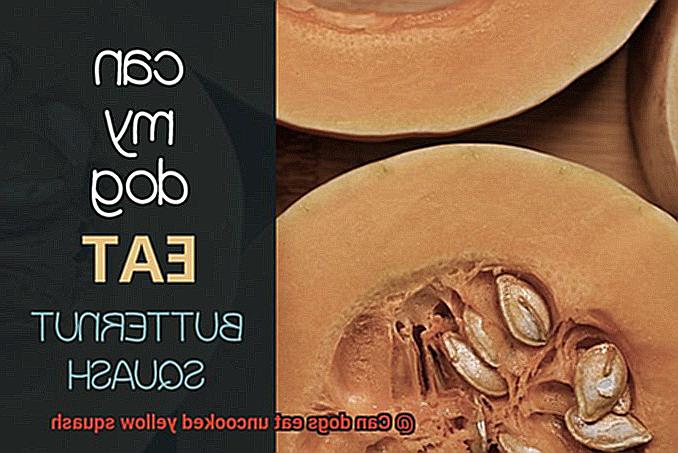
When feeding uncooked yellow squash to your French Bulldog, follow these preparation and safety tips:
- Wash the yellow squash thoroughly to remove any dirt or pesticides that may be present on the skin.
- Avoid seasoning the yellow squash with harmful spices or seasonings such as garlic or onion powder, as they can be toxic to dogs.
- Remove the seeds, as they can pose a choking hazard or cause intestinal blockage if consumed in large quantities.
Potential Risks of Feeding Uncooked Yellow Squash to Dogs
French Bulldogs are known for their unique personalities and distinctive appearance. As a responsible pet owner, you want to ensure your furry friend stays healthy and happy.
While yellow squash may seem like a nutritious addition to your dog’s diet, there are potential risks associated with feeding it to them raw. In this article, we’ll explore these risks in detail, so you can make informed decisions about what’s best for your French Bulldog.
Cucurbitacin Poisoning:
Cucurbitacin, a natural toxin found in certain varieties of squash, including yellow squash, can be harmful to dogs if consumed in large quantities. While it’s generally safe for humans, dogs have a lower tolerance for this toxin.
Symptoms of cucurbitacin poisoning include vomiting, diarrhea, excessive drooling, abdominal pain, dehydration, and even organ failure. So, it’s crucial to avoid feeding your French Bulldog raw yellow squash regularly or in large amounts.
Gastrointestinal Upset:
The high fiber content in raw squash can lead to digestive issues such as gas, bloating, and diarrhea in dogs. French Bulldogs are already prone to sensitive stomachs, making them more susceptible to gastrointestinal upset when consuming uncooked vegetables like yellow squash.
Digestive Challenges:
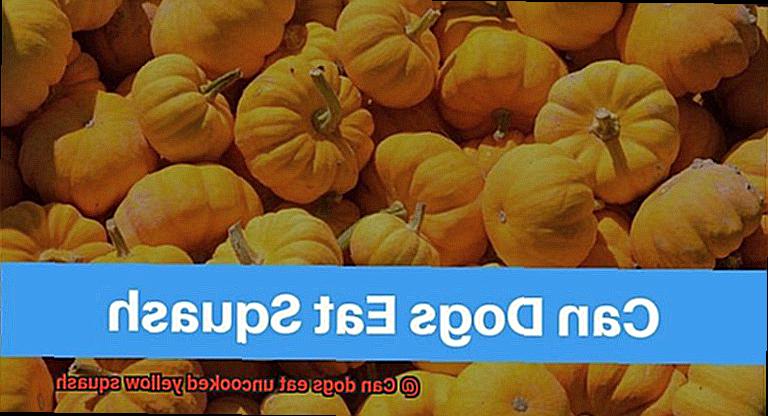
Dogs have shorter digestive tracts compared to humans, making it challenging for them to properly digest raw vegetables like yellow squash. Their bodies may struggle to break down and absorb the nutrients from uncooked squash effectively. This can result in reduced nutrient absorption and potential nutritional imbalances over time.
Choking and Obstruction Hazards:
Feeding large chunks of uncooked yellow squash to your French Bulldog can pose a choking or obstruction risk. To mitigate this danger, always cut the squash into small, manageable pieces before offering it to your dog. This reduces the chances of a choking incident or intestinal blockage.
Individual Sensitivities and Allergies:
Just like humans, dogs can have individual sensitivities or allergies to certain foods, including yellow squash. Even if cooked, some French Bulldogs may experience adverse reactions such as itching, skin rashes, or gastrointestinal issues when consuming this vegetable. Always monitor your dog closely when introducing any new food into their diet.
Benefits of Feeding Cooked Yellow Squash to Dogs
The Benefits of Feeding Cooked Yellow Squash to Your French Bulldog
Hey there, French Bulldog lovers. Are you looking for a nutritious and delicious addition to your furry friend’s diet? Well, look no further than cooked yellow squash. This humble vegetable is not only tasty but also packed with health benefits that will keep your French Bulldog feeling their best. As an expert in dog nutrition, I’m here to share with you the amazing advantages of adding cooked yellow squash to your Frenchie’s mealtime. Let’s dig in.
Hydration Hero
French Bulldogs are prone to overheating, especially during those scorching summer months. That’s where cooked yellow squash comes to the rescue. With its high water content, this veggie helps keep our furry friends hydrated and cool. It’s like a refreshing splash of watermelon on a hot day.
Weight Management Wonder
Is your French Bulldog carrying a few extra pounds? Cooked yellow squash can be your secret weapon in their weight loss journey. Low in calories and fat, it fills up their tummy without adding unnecessary fluff to their waistline. Think of it as a guilt-free snack that keeps them satisfied and trim.
Digestive Delight
We all know how sensitive French Bulldogs’ tummies can be. Cooked yellow squash is gentle on their digestive system and can help promote regular bowel movements. Say goodbye to constipation and hello to happy poops.
Skin and Coat Superstar
Frenchies are known for their adorable wrinkly skin and glossy coats. Cooked yellow squash plays a vital role in keeping their skin healthy and their coat shiny. Packed with vitamins A and C, it supports skin cell growth and collagen production, making sure your Frenchie looks fabulous from head to tail.
Overall Well-being Booster
Cooked yellow squash is not just a pretty face; it’s also packed with antioxidants that help fight off those pesky free radicals. By reducing inflammation and supporting your Frenchie’s immune system, it keeps them feeling their best and ready for all the zoomies life throws their way.
Now that you know the incredible benefits of cooked yellow squash for your French Bulldog, it’s time to incorporate it into their diet. Remember to keep it simple and avoid any seasonings or oils that could be harmful to your furry friend. Start with small amounts and monitor their reaction to ensure they tolerate it well. And as always, consult with your veterinarian before making any significant changes to your Frenchie’s diet.
Removing the Seeds Before Serving Yellow Squash
As responsible pet parents, we always want to ensure that our furry friends are safe and healthy. That’s why it’s important to remove the seeds from yellow squash before serving it to your beloved French Bulldog. Those little seeds may seem harmless, but they can pose a serious choking hazard, especially for small breeds like Frenchies who tend to gulp down their food without chewing.
Not only can the seeds cause choking, but they can also lead to digestive issues such as blockages or discomfort in the gastrointestinal tract. So, let’s dive into the step-by-step process of removing those pesky seeds and preparing a delicious and safe treat for your Frenchie.
Wash the Yellow Squash
Start by washing the yellow squash thoroughly under running water to remove any dirt or debris. We don’t want any unwanted surprises in our furry friend’s meal.
Slice the Squash
Next, cut off both ends of the squash and slice it lengthwise into two halves. This will make it easier to access and remove those bothersome seeds.
Scoop Out the Seeds
Now comes the fun part. Use a spoon or a knife to gently scoop out the seeds from each half of the squash. Make sure to scrape out all the seeds and discard them properly. We don’t want our curious Frenchies getting their paws on them.
Cut into Bite-sized Pieces
Once the seeds are removed, you can cut the squash into smaller, bite-sized pieces that are easier for your Frenchie to chew and digest. Remember, their little jaws need some extra love and care.
Cook the Yellow Squash
It is generally recommended to lightly steam or boil yellow squash before serving it to your Frenchie. This will make it softer and more easily digestible. Plus, it brings out all those delicious flavors.
Keep It Simple
Avoid adding any seasonings or spices to the cooked yellow squash. Some ingredients like garlic or onions can be toxic to dogs, so it’s best to keep it plain and simple.
Cool Down
Before offering yellow squash to your Frenchie, allow it to cool down sufficiently. We don’t want any burns or discomfort in their precious little mouths or throats.
Monitor Their Reaction
Every dog is unique, and just like humans, they can have different reactions to new foods. So, when introducing yellow squash into your Frenchie’s diet, monitor their reaction closely. If you notice any signs of digestive upset or allergies, discontinue feeding it to them and consult with your veterinarian.
How Much Yellow Squash Should Dogs Eat?
Look no further than yellow squash. This nutritious vegetable can be a healthy addition to your pup’s meals, but it’s essential to know how much is the right amount. In this article, we’ll dive into the world of yellow squash and provide expert insights on how much your French Bulldog should eat based on their size, age, and overall health.
Size Matters: Tailoring the Portions:
Just like humans, dogs come in all shapes and sizes, and their dietary needs can vary significantly. When it comes to yellow squash, portion control is key. Here’s a breakdown of how much yellow squash is suitable for different sizes of French Bulldogs:
- Small French Bulldogs (weighing around 20 pounds): Start with half a cup of cooked yellow squash per day. Monitor their reaction and adjust the portion accordingly.
- Medium French Bulldogs (weighing between 20-40 pounds): Aim for one cup of cooked yellow squash per day. Keep an eye out for any changes in their weight or digestion.
- Large French Bulldogs (weighing over 40 pounds): They can enjoy up to two cups of cooked yellow squash per day, divided into two meals. However, it’s always wise to consult with your vet for personalized recommendations.
Age and Health Considerations:
In addition to size, age and overall health play a crucial role in determining the appropriate amount of yellow squash for your French Bulldog:
- Puppies: For puppies under six months old, it’s essential to focus on their nutritional needs and provide a balanced diet formulated specifically for their growth. Consult your vet before introducing any new foods, including yellow squash.
- Adult Dogs: Adult French Bulldogs can benefit from the vitamins and minerals found in yellow squash. However, it should be offered as a supplement or treat rather than a replacement for their regular meals.
- Senior Dogs: Older French Bulldogs may have specific dietary requirements or health conditions. It’s crucial to consult with your vet before incorporating yellow squash into their diet to ensure it aligns with their needs.
Safety Tips and Preparations:
To ensure your French Bulldog’s safety and enjoyment when feeding them yellow squash, keep these tips in mind:
- Remove the seeds: Before serving yellow squash to your pup, remove the seeds, as they can pose a choking hazard and cause digestive issues.
- Cook it up: Cooking yellow squash before offering it to your French Bulldog can make it easier for them to digest and absorb its nutrients. Avoid adding seasonings or oils that could be harmful to your pup.
- Thoroughly wash raw yellow squash: If you prefer to feed your dog raw yellow squash, ensure it is thoroughly washed under running water to remove any dirt or contaminants.
Introducing Yellow Squash Into Your Dog’s Diet Gradually
You’ve heard about the amazing benefits of yellow squash and you’re eager to incorporate it into your French Bulldog’s diet. Good for you, dog parent. Yellow squash is packed with essential vitamins and minerals that can support your pup’s overall health. But before you start dishing out bowls of yellow squash, it’s important to introduce this new food slowly and carefully.
Why the slow approach, you ask? Well, dogs have sensitive tummies and sudden dietary changes can lead to some not-so-pleasant digestive issues. We want to avoid any tummy troubles and make sure your Frenchie enjoys the yellow squash without any discomfort.
Here’s a step-by-step guide on how to introduce yellow squash into your dog’s diet gradually:
- Start Small: Begin by offering a small amount of cooked yellow squash as a treat or mixed into their regular food. This will help your pup get accustomed to the new taste and texture.
- Observe and React: Keep a close eye on your furry friend for any signs of discomfort or digestive issues. We’re talking about vomiting, diarrhea, or any unusual behavior. If you notice anything concerning, stop feeding the yellow squash immediately and consult with your vet.
- Increase Gradually: If everything goes well (fingers crossed.), gradually increase the amount of yellow squash in their meals over the course of several days. This slow increase will allow your Frenchie’s digestive system to adjust and prevent any sudden surprises in the bathroom department.
- Cook It Up: It’s best to cook the yellow squash before feeding it to your pup. Cooking helps break down the vegetables’ cell walls, making it easier for dogs to digest. Steaming or boiling are great cooking methods to retain the nutrients while ensuring it’s soft and palatable for your furry friend.
- Keep It Plain: When cooking the yellow squash, avoid adding any spices or seasonings that may be harmful to dogs. Garlic and onion powder, for example, can cause some serious health issues for our canine companions. Stick to plain, unseasoned yellow squash.
- Monitor and Adjust: Keep an eye on your Frenchie’s stool consistency and overall health during this transition period. If you notice any negative changes or discomfort, consult with your veterinarian before continuing to feed yellow squash.
Remember, every dog is unique, and what works for one pup may not work for another. So, take it slow and pay attention to your Frenchie’s individual needs. Introducing yellow squash gradually will ensure a smooth transition and a happy, healthy doggy.
Signs of Allergies or Sensitivities to Yellow Squash in Dogs
French Bulldogs are known for their sensitive stomachs and allergies. It’s important to be aware of any signs of allergies or sensitivities that your Frenchie may have, especially when introducing new foods like yellow squash into their diet. In this section, we will explore the signs of allergies or sensitivities to yellow squash in dogs.
Itchy Skin and Hair Loss:
One of the most common signs of allergies or sensitivities to yellow squash in dogs is itching, redness, and inflammation of the skin. Your Frenchie may scratch or bite at affected areas, leading to hair loss and sores. If you notice your dog constantly scratching or chewing themselves after consuming yellow squash, it could be a sign of an allergic reaction.
Digestive Issues:
In addition to skin problems, digestive issues can also occur in dogs with allergies or sensitivities to yellow squash. Vomiting, diarrhea, and gas are common symptoms that may indicate a reaction to this vegetable. If your Frenchie experiences any of these issues after eating yellow squash, it’s best to remove it from their diet and consult with a veterinarian.
Respiratory Symptoms:
Some dogs may develop respiratory symptoms after consuming yellow squash. Sneezing, coughing, or difficulty breathing could indicate an allergic reaction. If you notice these symptoms in your Frenchie, it’s important to seek veterinary attention immediately.
Severe Reactions:
In rare cases, dogs with allergies or sensitivities to yellow squash may experience a severe allergic reaction called anaphylaxis. This is a medical emergency and requires immediate veterinary attention. Signs of anaphylaxis can include swelling of the face and throat, difficulty swallowing or breathing, and collapse. It’s crucial to be vigilant and seek prompt medical care if you suspect your Frenchie is experiencing anaphylaxis.
The Role of Veterinarians in Ensuring a Balanced Diet for Your Dog
French Bulldogs are adorable and affectionate companions, but they can be prone to allergies and sensitivities, making it crucial to provide them with a balanced diet. In this blog post, we will explore the valuable role veterinarians play in ensuring that your French Bulldog receives the right nutrition for their unique needs.
Expert Knowledge on Canine Nutrition:
Veterinarians have extensive knowledge of canine nutrition and dietary requirements. They can guide you on what foods are suitable for your French Bulldog and what should be avoided. By consulting with a veterinarian, you can ensure that your furry friend’s nutritional needs are being met.
Assessing Individual Health Conditions:
Every French Bulldog is unique, and their dietary needs may vary based on factors such as age, breed, size, activity level, and existing health issues or allergies. Veterinarians assess your dog’s health condition to determine if specific foods like uncooked yellow squash are appropriate for them.
Understanding Yellow Squash Benefits:
Yellow squash is a nutritious vegetable that can be beneficial for dogs. It is low in calories and high in vitamins (C and A) as well as minerals like potassium. Additionally, its fiber content aids in digestion. However, not all dogs can tolerate raw vegetables well.
Evaluating Tolerance to Raw Vegetables:
Veterinarians can assess whether your French Bulldog can handle raw vegetables like yellow squash. Some dogs may experience digestive issues or have difficulty digesting certain types of vegetables. Your veterinarian will consider your dog’s individual needs before recommending including uncooked yellow squash in their diet.
Preparing and Serving Yellow Squash Safely:
If your veterinarian determines that uncooked yellow squash is suitable for your French Bulldog, they may provide guidelines on how to prepare and serve it safely. For example, steaming or boiling the yellow squash before feeding it to your dog can help soften it and make it easier to digest.
Portion Sizes and Frequency:
Veterinarians can also advise pet owners on portion sizes and how often yellow squash can be included in your French Bulldog’s meals to maintain a balanced diet. They will consider your dog’s overall calorie intake and dietary requirements to ensure that they receive the right amount of nutrients.
cxIu1brzF8w” >
Conclusion
In conclusion, it is safe for dogs to eat uncooked yellow squash.
This vibrant vegetable can provide a nutritious boost to their diet. With its crunchy texture and refreshing flavor, yellow squash can be a delightful treat for your furry friend.
Packed with vitamins A and C, as well as fiber, this veggie can support your dog’s overall health and digestion. However, it’s important to remember that moderation is key.
So, go ahead and share some raw yellow squash with your canine companion, but always keep portion sizes in mind.
